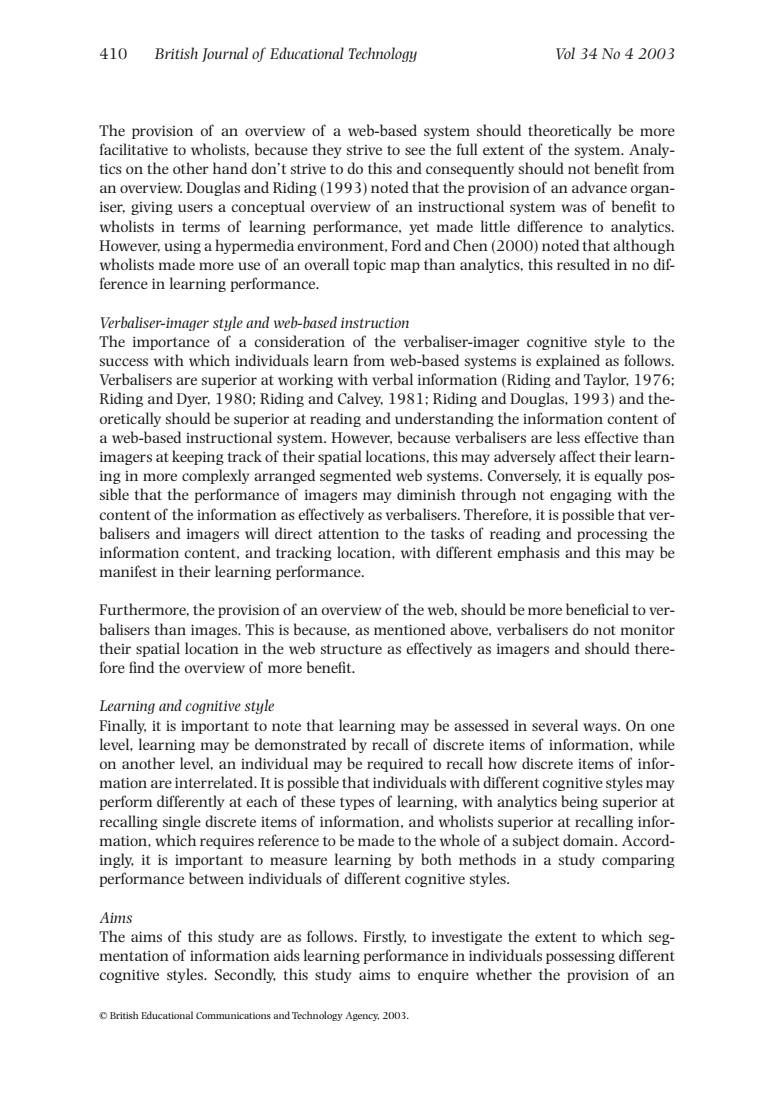正在加载图片...

410 British Journal of Educational Technology al34No42003 The provision of an overview of a web-based system should theoretically be more facilitative to wholists,because they strive to see the full extent of the system.Analy tics on the other hand don't strive to do this and consequently should not benefit from an overview.Douglas and Riding(1993)noted that ther ovision of an advance organ iser.giving users a conceptual overview of an instructional system was of beneit to wholists in terms of lea ning performance.yet made little difference to analytics ver using a he d and Chen (2000)noted that altho wholists made euse of an all topic map than analytics.this resulted in no dif ference in learning performance style and web-based inst The ed ex ve bal info and Tav r 19 Ridi g and Dy 980:Riding and ca ve 1981:Ri g and Do g3 and th supe or at re ng and u nderstan the info atio al gersat keeping track of the spatial s ma com ely.it is equa e that pe formance c ug. ngag with the ent of the informa ion as effectively as ver palisers and imagers wi t attention to the ta s of reading and pro ssing the tent,and tracking location,with different emphasis and this may be manifest in their learning performance. arthermore.the provision of an overview of the web.should be more beneficial to ver balisers than images.This is because.as mentioned above.verbalisers do not monitor their spatial location in the web structure as effectively as imagers and should there- fore find the overview of more benefit. Learning and cognitive style Finally.it is important to note that learning may be assessed in several ways.On one level.learning may be demonstrated by recall of discrete items of information,while on another level.an individual may be required to recall how discrete items of infor- mation are interrelated.It is possible that individuals with different cognitive styles may perform differently at each of these types of learning.with analytics being superior at recalling single discrete items of information.and wholists superior at recalling infor- mation,which requires reference to be made to the whole of a subject domain.Accord- ingly.it is important to measure learning by both methods in a study comparing performance between individuals of different cognitive styles. Aims The aims of this study are as follows.Firstly.to investigate the extent to which seg mentation of information aids learning performance in individuals possessing different cognitive styles.Secondly.this study aims to enquire whether the provision of an o British Educational ComThe provision of an overview of a web-based system should theoretically be more facilitative to wholists, because they strive to see the full extent of the system. Analytics on the other hand don’t strive to do this and consequently should not benefit from an overview. Douglas and Riding (1993) noted that the provision of an advance organiser, giving users a conceptual overview of an instructional system was of benefit to wholists in terms of learning performance, yet made little difference to analytics. However, using a hypermedia environment, Ford and Chen (2000) noted that although wholists made more use of an overall topic map than analytics, this resulted in no difference in learning performance. Verbaliser-imager style and web-based instruction The importance of a consideration of the verbaliser-imager cognitive style to the success with which individuals learn from web-based systems is explained as follows. Verbalisers are superior at working with verbal information (Riding and Taylor, 1976; Riding and Dyer, 1980; Riding and Calvey, 1981; Riding and Douglas, 1993) and theoretically should be superior at reading and understanding the information content of a web-based instructional system. However, because verbalisers are less effective than imagers at keeping track of their spatial locations, this may adversely affect their learning in more complexly arranged segmented web systems. Conversely, it is equally possible that the performance of imagers may diminish through not engaging with the content of the information as effectively as verbalisers. Therefore, it is possible that verbalisers and imagers will direct attention to the tasks of reading and processing the information content, and tracking location, with different emphasis and this may be manifest in their learning performance. Furthermore, the provision of an overview of the web, should be more beneficial to verbalisers than images. This is because, as mentioned above, verbalisers do not monitor their spatial location in the web structure as effectively as imagers and should therefore find the overview of more benefit. Learning and cognitive style Finally, it is important to note that learning may be assessed in several ways. On one level, learning may be demonstrated by recall of discrete items of information, while on another level, an individual may be required to recall how discrete items of information are interrelated. It is possible that individuals with different cognitive styles may perform differently at each of these types of learning, with analytics being superior at recalling single discrete items of information, and wholists superior at recalling information, which requires reference to be made to the whole of a subject domain. Accordingly, it is important to measure learning by both methods in a study comparing performance between individuals of different cognitive styles. Aims The aims of this study are as follows. Firstly, to investigate the extent to which segmentation of information aids learning performance in individuals possessing different cognitive styles. Secondly, this study aims to enquire whether the provision of an 410 British Journal of Educational Technology Vol 34 No 4 2003 © British Educational Communications and Technology Agency, 2003